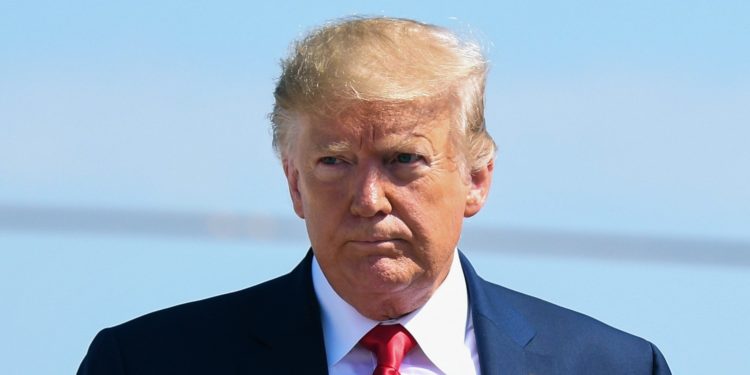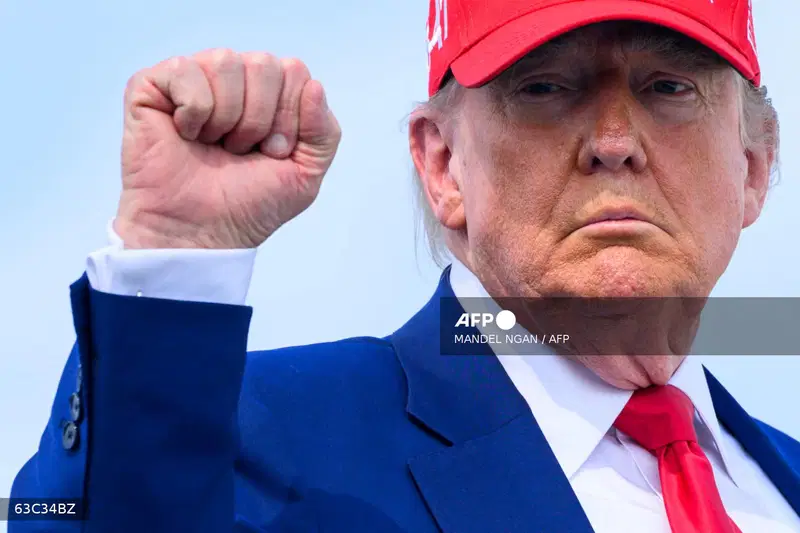Headline
We Will Reciprocate If Trump Hikes Tariffs – Brazilian President

Brazilian President Luiz Inacio Lula da Silva said Thursday that if US counterpart Donald Trump hiked tariffs on Brazilian products, he would reciprocate — but that he would prefer improved relations over a trade war.
The Latin American giant is one of the countries that Trump has threatened with higher tariffs.
“It’s very simple: if he taxes Brazilian products, Brazil will reciprocate in taxing products that are exported from the United States,” the 79-year-old Lula told a press conference.
Lula, currently in his third term, said he would prefer to “improve our relationship with the United States” and boost trade ties with Brazil’s second-largest trading partner after China.
“I want to respect the United States and for Trump to respect Brazil. That’s all,” he said.
READ ALSO: Meta Agrees To Pay Trump $25m To Settle Account Ban Lawsuit
Citing Trump’s comments that he plans to take back the Panama Canal or get control of Greenland, Lula said “he just has to respect the sovereignty of other countries.”
Lula also underscored the global threats facing democracy.
“For me, democracy is the most important thing in humanity right now … Either we keep democracy working or we will have states more authoritarian than Hitler and fascism.”
Lula, whose country will host the COP30 UN climate talks in the Amazonian city of Belem in November, added that Trump’s decision to withdraw from the Paris climate accord was “a step back for human civilization.”
He said he did not want a summit where “measures are approved, everything looks very nice on paper and then no country complies,” slamming wealthy nations for failing to meet previous promises to give billions of dollars to help developing nations deal with the fallout of climate change.
READ ALSO: Deportation: Trump Administration Revokes Protected Status For Venezuelans
“We want something very real so that we can know if we are serious or not about the climate issue.”
The president held a wide-ranging press conference in the capital Brasilia, urging journalists not to hold back in their questions as his government seeks to reclaim the narrative after battling a wave of disinformation.
After undergoing emergency surgery to stop a brain bleed in December linked to an earlier fall, Lula vowed he was fully recovered and had “the energy of a 30-year-old.”
With less than two years left of his third presidential term, Lula’s approval rating has sunk to 47 percent, according to a Quaest poll published this week, with a notable drop in support from his key electoral base in the low-income northeast of the country.
Lula said he was “not worried” about opinion surveys, and brushed off concerns about high interest rates and public debt.
READ ALSO: Trump Slaps Sanctions On Colombia For Defying Deportation Push
As expected, the central bank on Wednesday hiked the key interest rate by one point to 13.25 percent, despite a new bank president being appointed by Lula — who has in the past criticized interest rate hikes.
“The president of the central bank cannot make a U-turn in a stormy sea,” Lula said, adding that he had faith in new bank chief Gabriel Galipolo who would have “autonomy to do whatever is necessary.”
Lula also sought to ease concerns over government interventions to lower food prices and vowed his commitment to “fiscal responsibility.”
His government is weighing reducing import tariffs on certain goods, and he highlighted the need to provide more financing to ramp up production, saying he was working on a plan with banks for “the largest credit program in the history of this country.”
Concerns over Brazil’s ability to curb public spending in December sent its currency, the real, to record lows against the dollar.
Headline
U.S. Lawmaker Reacts To Nigeria, U.S. Airstrikes

United States Congressman, Riley Moore, has stated that President Donald Trump is determined to put an end to the killing of Christians in Nigeria, warning that further action may follow if the violence persists.
Moore made the statement on Friday via his official X handle.
According to the lawmaker, the strike represents the first step in addressing what he described as the ongoing slaughter of Christians and the broader security crisis affecting Nigerians across religious and ethnic lines.
READ ALSO:US Dept Of War Shares Video Of Air Strikes In Nigeria
“President Trump has been clear that the killing of Christians in Nigeria must end,” he said.
He that the administration’s resolve on the matter should not be underestimated.
“As I stated at the outset: Do not test President Trump‘s resolved in this matter.
READ ALSO:JUST IN: US Forces Bomb Terrorists Camps In Nigeria
“Tonight’s strike in coordination with the Nigerian government is just the first step to ending the slaughter of Christians and the security crisis affecting all Nigerians,” he said.
He stressed that the operation signals a stronger stance by the United States in support of Nigeria’s efforts to tackle terrorism and violent extremism, noting that further measures could be taken if the situation does not improve.
Headline
US Dept Of War Shares Video Of Air Strikes In Nigeria

A video footage of the US military air strikes in Nigeria has emerged.
The video was released by the US Department of War following its air strikes against terrorists in Sokoto.
Earlier, the US secretary of War, Pete Hegseth had confirmed that military air strikes hit terrorists in Nigerians, saying it was deadly.
Later on, the US. African Command, confirmed that it conducted the attacks described as very deadly by President Donald Trump.
Trump said he was only keeping the promise he made earlier last month to strike the terrorists he believes are killing innocent Christians.
READ ALSO:JUST IN: US Forces Bomb Terrorists Camps In Nigeria
Although described as powerful and deadly, the casualty caused by the attack is yet to be released.
Explaining further, security expert, Brant Philip, said the strikes may have been launched “from the USS Paul Ignatius, using a Tomahawk missile.”
The Nigerian government through its ministry of foreign affairs has also confirmed that the strikes were successful.
Watch video here
Headline
JUST IN: US Forces Bomb Terrorists Camps In Nigeria

United States President Donald Trump said US forces conducted deadly strikes against Islamic State terrorists in northwestern Nigeria, and vowed more attacks if the militants keep killing Christians.
“I have previously warned these Terrorists that if they did not stop the slaughtering of Christians, there would be hell to pay, and tonight, there was,” Trump posted on his Truth Social platform, adding that “the Department of War executed numerous perfect strikes.”
READ ALSO:JUST IN: Kano Lawmaker, Sarki Aliyu Daneji, Dies Hours After Colleague’s Passing
Trump stated that the Department of War “executed numerous perfect strikes, as only the United States is capable of doing. Under my leadership, our Country will not allow Radical Islamic Terrorism to prosper.”
The US president wished everyone Merry Christmas, “including the dead Terrorists, of which there will be many more if their slaughter of Christians continues.”
Details later.

 News4 days ago
News4 days agoPHOTOS: New Era In Furupagha-Ebijaw As Okpururu 1 Receives Staff Of Office

 News3 days ago
News3 days agoUBTH CMD Marks 120 Days In Office, Expresses Commitment To Providing Conducive Working Environment

 News4 days ago
News4 days agoOPINION: Gumi And His Terrorists

 News3 days ago
News3 days agoFIRS Confirms NIN As Tax ID

 News4 days ago
News4 days agoFG Declares Public Holidays For Christmas, New Year Celebrations

 Metro3 days ago
Metro3 days agoFintiri Pardons Man Sentenced To Death For ‘Killing Herdsman In Self-defence’, Others

 News4 days ago
News4 days agoOPINION: Christmas And A Motherless Child

 News2 days ago
News2 days agoJUST IN: Kano Lawmaker, Sarki Aliyu Daneji, Dies Hours After Colleague’s Passing

 News4 days ago
News4 days agoOPINION: My Man Of The Season

 News4 days ago
News4 days agoKWAM 1 Withdraws From Awujale Race, Ends Court Challenge


























